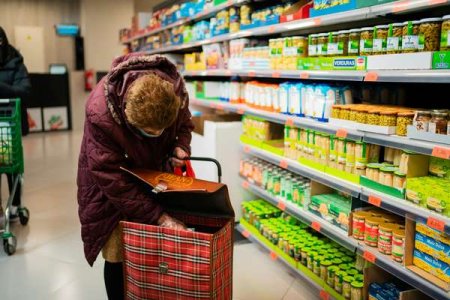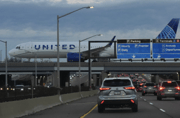Prices are climbing again—and it’s not just eggs this time!
- Replies 0
As we navigate the aisles of our local supermarkets, we're accustomed to the seasonal ebb and flow of prices.
However, recent political decisions have sent a ripple effect through the market that's impacting more than just our wallets. The Trump administration's tariff plan has been a roller coaster of policy changes, with certain products receiving exemptions while others face steep tariffs.
These tariffs are not just numbers on a page—they translate into real-world price hikes for everyday items that fill our shopping carts.
In recent days, President Donald Trump’s administration has granted tariff exemptions for smartphones, computers, and several other electronics—most of which are imported from China. This move offers major relief to tech giants like Apple, which depend heavily on foreign-manufactured goods.
It marks yet another reversal in the administration’s unpredictable approach to tariffs, which have been imposed and then delayed, contributing to widespread confusion.
Trump’s tariffs could substantially raise prices on a range of grocery items, largely due to their ripple effects on global trade and supply chains.
A significant share of the fresh fruits and vegetables consumed in the US comes from imports, especially from Mexico.

Tariffs on these goods would immediately drive up prices. Even domestically grown produce may become more expensive, as key farming inputs like fertilizers—often imported—could also become costlier due to the trade measures.
The Fresh Price of... Everything?
Now, let's talk about the produce section. Many of us take for granted the year-round availability of fresh fruits and vegetables, a bounty made possible through international trade.
A significant portion of these goods come from our neighbors to the south, Mexico, and any tariffs on these imports directly affect their cost. But it's not just the imported produce that's getting pricier.
Even domestically grown fruits and veggies could see a price surge due to increased costs for imported fertilizers and other agricultural essentials.
Here's a list of the supermarket staples that could see price increases due to the tariffs:
These items are particularly vulnerable because they are perishable and often imported, making them sensitive to changes in trade policies.
Aside from grocery items, the tariffs are also hitting the costs of cars and oil in the US. Many have spoken up about their concerns on these price hikes due to the tariffs imposed by the administration, with Whoopi Goldberg saying, "This isn't what we want."
Source: TODAY / Youtube.
Fortunately, there are still some groceries immune to tariffs, so there's still some hope on the horizon. You can also find out if you're one of the states that can be hardest hit by the tariffs.
Read next: Forever no more? Stamp price hike ahead

Have you noticed price increases in your shopping trips? Are you concerned about how tariffs might affect your budget or home value? Share your thoughts and experiences in the comments below!
However, recent political decisions have sent a ripple effect through the market that's impacting more than just our wallets. The Trump administration's tariff plan has been a roller coaster of policy changes, with certain products receiving exemptions while others face steep tariffs.
These tariffs are not just numbers on a page—they translate into real-world price hikes for everyday items that fill our shopping carts.
In recent days, President Donald Trump’s administration has granted tariff exemptions for smartphones, computers, and several other electronics—most of which are imported from China. This move offers major relief to tech giants like Apple, which depend heavily on foreign-manufactured goods.
It marks yet another reversal in the administration’s unpredictable approach to tariffs, which have been imposed and then delayed, contributing to widespread confusion.
Trump’s tariffs could substantially raise prices on a range of grocery items, largely due to their ripple effects on global trade and supply chains.
A significant share of the fresh fruits and vegetables consumed in the US comes from imports, especially from Mexico.

Tariffs imposed by President Donald Trump's administration could lead to price hikes on various food items in the United States due to their impact on international trade and supply chains. Image source: Victoriano Izquierdo / Unsplash.
Tariffs on these goods would immediately drive up prices. Even domestically grown produce may become more expensive, as key farming inputs like fertilizers—often imported—could also become costlier due to the trade measures.
The Fresh Price of... Everything?
Now, let's talk about the produce section. Many of us take for granted the year-round availability of fresh fruits and vegetables, a bounty made possible through international trade.
A significant portion of these goods come from our neighbors to the south, Mexico, and any tariffs on these imports directly affect their cost. But it's not just the imported produce that's getting pricier.
Even domestically grown fruits and veggies could see a price surge due to increased costs for imported fertilizers and other agricultural essentials.
Here's a list of the supermarket staples that could see price increases due to the tariffs:
- Avocados
- Beer
- Canola oil
- Lettuce
- Maple syrup
- Peppers
- Strawberries
- Salmon
- Tomatoes
These items are particularly vulnerable because they are perishable and often imported, making them sensitive to changes in trade policies.
Aside from grocery items, the tariffs are also hitting the costs of cars and oil in the US. Many have spoken up about their concerns on these price hikes due to the tariffs imposed by the administration, with Whoopi Goldberg saying, "This isn't what we want."
Source: TODAY / Youtube.
Fortunately, there are still some groceries immune to tariffs, so there's still some hope on the horizon. You can also find out if you're one of the states that can be hardest hit by the tariffs.
Read next: Forever no more? Stamp price hike ahead
Key Takeaways
- Tariffs imposed by President Donald Trump's administration could lead to price hikes on various food items in the United States due to their impact on international trade and supply chains.
- A list of ten food products prone to price increases includes avocados, beer, canola oil, lettuce, maple syrup, peppers, strawberries, salmon, and tomatoes—mainly because they are fresh and often imported.
- Cities in Utah, such as Park City, Granite, and West Mountain, are experiencing high housing market values, with Park City at the top, indicating a strong local real estate market.
- The changes in tariff policies are creating uncertainty and have potential ripple effects on the prices of basic goods across the country, affecting the overall cost of living for American consumers.
Have you noticed price increases in your shopping trips? Are you concerned about how tariffs might affect your budget or home value? Share your thoughts and experiences in the comments below!
Last edited:






